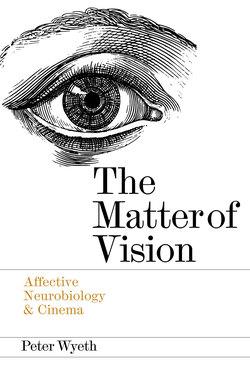Читать книгу The Matter of Vision - Peter Wyeth - Страница 24
На сайте Литреса книга снята с продажи.
The Matter of Vision and Philosophy
ОглавлениеThe task this project set itself, many years ago, was to try to understand the real basis of the power of Cinema. The reason the task was set that nowhere within the prevailing framework of Film Theory was there anything remotely sufficient to that task, which seemed to me to be among the first questions to be answered about Cinema.
The two instincts that set me off on this pursuit were that Cinema was much more powerful than it was given credit for, even by its strongest adherents, and that much of that strength could be accounted for by the notion that we take in much more unconsciously from Cinema than consciously, and therein lay its secret power.
That led me to look at Vision, the unconscious – for which I propose the positive and independent term, the Automatic, and Emotion – which was the one-word definition of Cinema put forward by Sam Fuller in Godard’s Pierrot Le Fou.
Against that trio I concluded were ranged Language, and its ideology of Logocentrism, Consciousness, with the common view that it was the peak of being human, and Reason, which had the enormous successes of science to its credit, and the gradual encroachment upon superstition and irrationality that Bacon set as its task in the late medieval period, reaching a ferment in the Enlightenment.
In terms of philosophy, there is a view that nothing of importance has been said since the 18th Century, and with Spinoza and Leibniz, Hume and Kant to contend with, that is not entirely without justification.
Science has sometimes been accused of a certain naiveté in moving from laboratory experiment and results to the interpretation of those results, which tends to move to the terrain of philosophy, with its porous boundaries between the physical and the metaphysical, between the materialism of science and the terrain vague where the material no longer holds.
That is why Leibniz and arguably Spinoza are if anything more relevant today than they were in their own time. Physics today is still confirming the insights of Leibniz about some of the most basic questions, whereas Spinoza’s anti-theological propositions hold more appeal for me, as despite Leibniz’s genius he was irrevocably wedded to theological rationalisation at the expense, I would suspect, of a wholehearted rationalism. The meeting of three days when Leibniz went to visit the older Spinoza in Amsterdam, a liberal refuge, in 1679, is a fascinating moment in history of which unfortunately there is no direct record, only imputations of how Leibniz’s views changed after his visit to the Master. There is little sense of a similar change in the views of Spinoza. Leibniz appears to have edged towards the thoroughgoing stern materialism of Spinoza, but could not or would not free himself of his debt to the theology department of his life.
Kant, regarded as the greatest modern philosopher by many, reacted against both Leibniz and Hume, and yet in so doing, and despite his enormous achievements in philosophy, it could be argued that seen from today’s perspective, Kant in fact moved away from science and his Critique of Pure Reason ended ironically as a dangerous endorsement of it, claiming a certain autonomy for Reason that laid the fateful trail of German Idealism away from science and scientific materialism, betraying Bacon despite his dedication to him in the first Critique.
